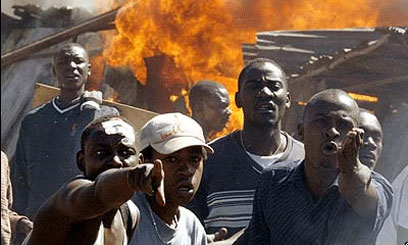
She expressed concerns that victims reported their cases when it was too late while others were not in a position to identify their attackers/FILE
NAIROBI, Kenya, Aug 10 – The Office of the Director of Public Prosecutions on Friday said efforts to prosecute the lower and middle level perpetrators of the 2008 post-election violence may hit a snag.
Acting Deputy Director of Public Prosecutions Dorcas Oduor who chairs a 20-member taskforce assessing current investigations into 6,000 cases, said the process is hampered by lack of evidence and inconsistencies in the way crimes were reported following the violence.
“The people found it hard to go somewhere to report… some were injured, some were displaced; these issues really impact on our ability to recommend the best way forward,” she said.
Oduor said many other challenges also arose after reviewing only 1,446 cases prompting the taskforce to compile an interim report informing the Commissioner of Police, the Justice and Constitutional Affairs Ministry and the office of the Attorney General of the challenges they faced.
She expressed concerns that victims reported their cases when it was too late while others were not in a position to identify their attackers.
According to their review, most victims reported their cases two months after they were in camps for Internally Displaced Persons.
She further said that at the time of the violence, there was institutional inability especially among the police who were forced to offer humanitarian support instead of investigations due the serious crimes that left thousands of Kenya suffering.
“Taking it into account that there was no eye witness, the policemen did not have time to go to the site. We realised there was a lot of institutional incapacity,” she added. “When the accused person is not identified and the incident is reported too late it becomes very difficult.”
Odour was further concerned that sexual violence offences were especially the most difficult to prove as many women were gang raped and could not recall the rapists and the fact that most of them also did not immediately report hence tampered with the evidence.
“In some instances, the women described the rapists in what they wore or the language they spoke making it difficult to determine whether they were police or ordinary people posing as police,” she said.
According to Oduor, the work of the task force is further hampered by challenges of dealing with the police as an investigator and as a perpetrator of crimes during the post election violence.
She also singled out the wrong approach used when investigations into the 2008 violence started arguing that it should have been done differently since it happened during mass atrocities.
“The problem started right at the beginning when they started investigations. These are incidents that occurred during mass atrocities, they were being looked as if they were specific offences. They used the high level of a standard of prove as in the criminal procedure. That ought not to have been so,” she explained.
Owing it to the challenges the ODPP was facing, Oduor said they are in the process of contacting the United Nations and civil society groups to brainstorm on how best the 2008 post election violence can be addressed.
The 20-member taskforce was to decide whether there is enough evidence to pursue the 6,000 cases that are currently before the courts.









































